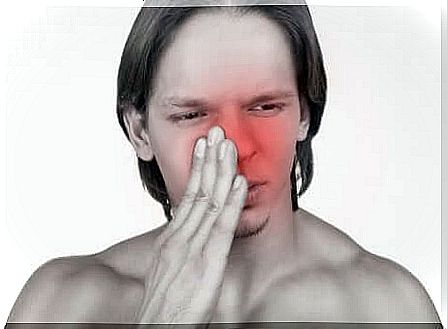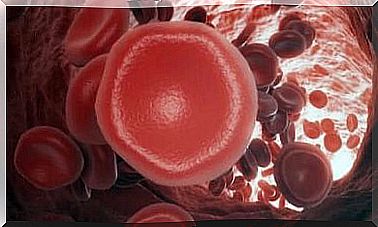Breathing Through The Mouth: Causes And Consequences
Breathing through the mouth is an abnormal way of doing it. It is a very common disorder in the population, with serious long-term results. We will see what is the origin of this fact as well as its consequences.

Breathing through your mouth is not the normal way to do this. As humans, we have a nose, which is a specialized organ for inhaling and expelling air in and out. When we breathe through our mouths, it is because something is interfering with the normal course of breathing. It could be an obstruction of the airway or a bad habit.
When mouth breathing lasts over time and becomes chronic, the consequences can get worse. The more air you inhale through your mouth, the more serious your future problems will be. And, of course, the more difficult the treatment will be.
The nose has essential functions in breathing. Due to its anatomical layout, it is responsible for humidifying the air entering the body. The nasal mucosa makes inspiration more efficient by protecting internal organs.
The nose is also a filter for bacteria and for particles that could come from outside. Contaminants are stopped by the nasal anatomy, preventing us from allergies and infections.
Breathing through the mouth: symptoms
One might think that breathing through the mouth is a rather blatant pathology. Seeing a person open their lips to bring air into their body, one could already be diagnosed. However, things are not that simple.
Oral breathing can be momentary and even physiological. In situations where a lot of oxygen is required, human physiology can be expected to resort to the mouth. What is not normal is the persistence over time.

Among the symptoms of mouth breathing we have:
- Presence of the tongue between the teeth by closing the oral cavity.
- Poor nighttime rest: with fatigue and exhaustion during the day, in addition to signs of poor sleep, such as dark circles.
- Altered tone of voice: The person may speak with a nasal voice or have a nasal voice, which is not normal when heard.
- Dental alterations: the child who breathes through the mouth has altered dental arches. Teeth are badly positioned and mouth breathing can even delay their onset.
- Dryness: The oral mucosa and lips become drier when breathing through the mouth. It is common for cracking to appear at the corners.
- Repeated infections: People who breathe through their mouths suffer from repeated pharyngitis, sinusitis and ear infections. Poor respiratory dynamics eliminates the first barrier for microorganisms, which can enter as they please.
- Snoring: When sleeping, the person breathing through the mouth snores. This leads to sleep apnea, which consist of little awakenings at night that the person does not even notice.
Causes of mouth breathing

Usually, the body is forced to breathe through the mouth when the airway is blocked. The causes of obstruction are varied. Among them, we find:
- Tonsillar hypertrophy: This is a common condition in pediatric age. Lymphatic tissue in the tonsils or adenoids – or both – enlarges. Therefore, as the tonsils enlarge, part of the passage of air through the nose is interrupted.
- Rhinitis and sinusitis: Chronic inflammation of the nasal mucosa or paranasal sinuses, of course, complicates nasal breathing. It could be a continuous allergic reaction or repeated infections. Whatever the origin, the end result is generally the same: it is difficult to breathe through the nose.
- Deviation of the septum: Due to birth defects or trauma, the septum of the nose may deviate. If the deviation is large, one of the nasal orifices becomes blocked, or both at the same time. Even if there is corrective surgery for the deviated septum, symptoms may persist even after surgery.
- Nasal polyps: The lining of the nose may grow excessively inside the openings. These abnormal growths are the polyps of the nose. Whether due to their quantity or volume, they tend to obstruct the flow of air.
Consequences

The consequences of breathing through the mouth for long periods of time are complicated. It is very difficult to be able to prevent the changes that are occurring. Among these consequences, we find:
- Respiratory infections: from common colds to pneumonia.
- Lack of oxygenation of the brain: The air inhaled by the mouth prevents it from taking advantage of all the oxygen. With less oxygen circulating, neuronal functions are impoverished. In children who breathe through their mouths, learning deficit is common.
- Spine alterations: Breathing through the mouth is associated with poor general body posture. The person breathing through the mouth has their head tilted forward and the spine copies this movement by changing its structure.
- Poor development of the skull: One of its indirect functions of nasal breathing is the ability to shape the bones of the head as they grow. If the child has been breathing through his mouth since he was little, he is not stimulating the bones of the skull properly. The lower jaw does not develop sufficiently and the palate becomes arched.
Have you ever been told that you breathe through your mouth while sleeping? If so, consider seeing your doctor to examine you and analyze if everything is okay or if you need treatment. Remember, this will help you gain well-being.









